Fleurs du Mal Magazine


Or see the index

Alfred Lord Tennyson
(1809-1892)
The Brook
I come from haunts of coot and hern,
I make a sudden sally
And sparkle out among the fern,
To bicker down a valley.
By thirty hills I hurry down,
Or slip between the ridges,
By twenty thorpes, a little town,
And half a hundred bridges.
Till last by Philip’s farm I flow
To join the brimming river,
For men may come and men may go,
But I go on for ever.
I chatter over stony ways,
In little sharps and trebles,
I bubble into eddying bays,
I babble on the pebbles.
With many a curve my banks I fret
By many a field and fallow,
And many a fairy foreland set
With willow-weed and mallow.
I chatter, chatter, as I flow
To join the brimming river,
For men may come and men may go,
But I go on for ever.
I wind about, and in and out,
With here a blossom sailing,
And here and there a lusty trout,
And here and there a grayling,
And here and there a foamy flake
Upon me, as I travel
With many a silvery waterbreak
Above the golden gravel,
And draw them all along, and flow
To join the brimming river
For men may come and men may go,
But I go on for ever.
I steal by lawns and grassy plots,
I slide by hazel covers;
I move the sweet forget-me-nots
That grow for happy lovers.
I slip, I slide, I gloom, I glance,
Among my skimming swallows;
I make the netted sunbeam dance
Against my sandy shallows.
I murmur under moon and stars
In brambly wildernesses;
I linger by my shingly bars;
I loiter round my cresses;
And out again I curve and flow
To join the brimming river,
For men may come and men may go,
But I go on for ever.
Alfred Lord Tennyson poetry
fleursdumal.nl magazine
More in: Archive S-T, Tennyson, Alfred Lord
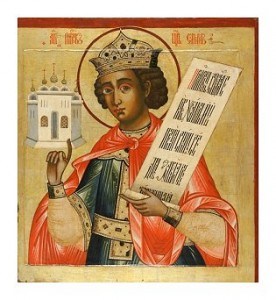
Chapter 1
The song of songs, which is Solomon’s.
Let him kiss me with the kisses of his mouth: for thy love is better than wine.
Because of the savour of thy good ointments thy name is as ointment poured forth, therefore do the virgins love thee.
Draw me, we will run after thee: the king hath brought me into his chambers: we will be glad and rejoice in thee, we will remember thy love more than wine: the upright love thee.
I am black, but comely, O ye daughters of Jerusalem, as the tents of Kedar, as the curtains of Solomon.
Look not upon me, because I am black, because the sun hath looked upon me: my mother’s children were angry with me; they made me the keeper of the vineyards; but mine own vineyard have I not kept.
Tell me, O thou whom my soul loveth, where thou feedest, where thou makest thy flock to rest at noon: for why should I be as one that turneth aside by the flocks of thy companions?
If thou know not, O thou fairest among women, go thy way forth by the footsteps of the flock, and feed thy kids beside the shepherds’ tents.
I have compared thee, O my love, to a company of horses in Pharoah’s chariots.
Thy cheeks are comely with rows of jewels, thy neck with chains of gold.
We will make thee borders of gold with studs of silver.
While the king sitteth at his table, my spikenard sending forth the smell thereof.
A bundle of myrrh is my well-beloved unto me; he shall lie all night betwixt my breasts.
My beloved is unto me as a cluster of camphire in the vineyards of Engedi.
Behold, thou art fair, my love; behold, thou art fair; thou hast doves’ eyes.
Behold thou art fair, my beloved, yea pleasant: also our bed is green.
The beams of our house are cedar, and our rafters of fir.
Chapter 2
I am the rose of Sharon, and the lily of the valleys.
As the lily among thorns, so is my love among the daughters.
As the apple tree among the trees of the wood, so is my beloved among the suns. I sat down under his shadow with great delight, and his fruit was sweet to my taste.
He brought me to the banquetting house, and his banner over me was love.
Stay me with flagons, comfort me with apples: for I am sick of love.
His left hand is under my head, and his right hand doth embrace me.
I charge you, O ye daughters of Jerusalem, by the roes, and by the hinds of the field, that ye stir not up, nor awake my love, till he please.
The voice of my beloved! behold, he cometh leaping upon the mountains, skipping upon the hills.
My beloved is like a roe or a young hart: behold, he standeth behind our wall, he looketh forth at the windows, shewing himself through the lattice.
My beloved spake, and said unto me, Rise up, my love, my fair one, and come away.
For, lo, the winter is past, the rain is over and gone;
The flowers appear on the earth; the time of the singing of birds is come, and the voice of the turtle is heard in our land;
The fig tree putteth forth her green figs, and the vines with the tender grape give a good smell. Arise, my love, my fair one, and come away.
O my dove, that art in the clefts of the rock, in the secret places of the stairs, let me see thy countenance, let me hear thy voice; for sweet is thy voice, and thy countenance is comely.
Take us the foxes, the little foxes, that spoil the vines: for our vines have tender grapes.
My beloved is mine, and I am his; he feedeth among the lilies.
Until the day break, and the shadows flee away, turn, my beloved, and be thou like a roe or a young hart upon the mountains of Bether.
Chapter 3
By night on my bed I sought him whom my soul loveth: I sought him, but I found him not
I will rise now, and go about the city in the streets, and in the broad ways I will seek him whom my soul loveth: I sought him, but I found him not.
The watchman that go about the city found me: to whom I said, Saw ye him whom my soul loveth?
It was but a little that I passed from them, but I found him who my soul loveth: I held him, and would not let him go, until I had brought him into my mother’s house, and into the chamber of her that had conceived me.
I charge you, O ye daughters of Jerusalem, by the roes, and by the hinds of the field, that ye stir not up, nor awake my love, till he please.
Who is this that cometh out of the wilderness like pillars of smoke, perfumed with myrrh and frankincense, with all powders of the merchant?
Behold his bed, which is Solomon’s; threescore valiant men are about it, of the valiant of Israel.
They all hold swords, being expert in war: every man has his sword upon his thigh because of fear in the night.
King Solomon made himself a chariot of the wood of Lebanon.
He made the pillars thereof of silver, the bottom thereof of gold, the covering of it of purple, the midst thereof being paved with love, for the daughters of Jerusalem.
Go forth, O ye daughters of Zion, and behold King Solomon with the crown wherewith his mother crowned him in the day of his espousals, and in the day of the gladness of his heart.
Chapter 4
Behold, thou art fair, my love; behold, thou art fair; thou hast doves’ eyes within thy locks, thy hair is a flock of goats, that appear from mount Gilead.
Thy teeth are like a flock of sheep that are even shorn, which came up from the washing; whereof every one bear twins, and none is barren among them.
Thy lips are like a thread of scarlet, and thy speech is comely: thy temples are like a piece of pomegranate within thy locks.
Thy neck is like the tower of David builded for an armoury, whereupon there hang a thousand bucklers, all shields of mighty men.
Thy two breasts are like two young roes that are twins, which feed among the lilies.
Until the day break, and the shadows flee away, I will get me to the mountain of myrrh, and to the hill of frankincense.
Thou art all fair, my love; there is no spot in thee.
Come with me from Lebanon, my spouse, with me from Lebanon: Look from the top of Amana, from the top of Shenir and Hermon, from the lions’ dens, from the mountains of the leopards.
Thou hast ravished my heart, my sister, my spouse; thou hast ravished my heart with one of thine eyes, with one chain of thy neck.
How fair is thy love, my sister, my spouse! how much better is thy love than wine! and the smell of thy ointments than all spices!
Thy lips, O my spouse, drop as the honeycomb: honey and milk are under thy tongue; and the smell of thy garments is like the smell of Lebanon.
A garden inclosed is my sister, my spouse; a spring shut up, a fountain sealed.
Thy plants are an orchard of pomegranates, with pleasant fruits; camphire, with spikenard,
Spikenard and saffron; calamus and cinnamon, with all trees of frankincense; myrrh and aloes, with all the chief spices:
A fountain of gardens, a well of living waters, and streams from Lebanon.
Awake, O north wind; and come, thou south; blow upon my garden, that the spices thereof may flow out. Let my beloved come into his garden, and eat his pleasant fruits.
Chapter 5
I am come into my garden, my sister, my spouse: I have gathered my myrrh with my spice; I have eaten my honeycomb with my honey; I have drunk my wine with my milk: eat, O friends; drink, yea, drink abundantly, O beloved.
I sleep, but my heart waketh: it is the voice of my beloved that knocketh, saying, Open to me, my sister, my love, my dove, my undefiled: for my head is filled with dew, and my locks with the drops of the night.
I have put off my coat; how shall I put it on? I have washed my feet; how shall I defile them?
My beloved put in his hand by the hole of the door, and my bowels were moved for him.
I rose up to open to my beloved; and my hands dropped with myrrh, and my fingers with sweet-smelling myrrh, upon the handles of the lock.
I opened to my beloved; but my beloved had withdrawn himself, and was gone; my soul failed when he spake: I sought him, but I could not find him; I called him, but he gave me no answer.
The watchmen that went about the city found me, they smote me, they wounded me; the keepers of the walls took away my veil from me.
I charge you, O daughters of Jerusalem, if ye find my beloved, that ye tell him, that I am sick of love.
What is thy beloved more than another beloved, O thou fairest among women? what is thy beloved more than another beloved, that thou dost so charge us?
My beloved is white and ruddy, the chiefest among ten thousand.
His head is as the most fine gold, his locks are bushy, and black as a raven.
His eyes are as the eyes of doves by the rivers of waters, washed with milk, and fitly set.
His cheeks are as a bed of spices, as sweet flowers: his lips like lillies, dropping sweet smelling myrrh.
His hands are as gold rings set with the beryl: his belly is as bright ivory overlaid with sapphires.
His legs are as pillars of marble, set upon sockets of fine gold: his countenance is as Lebanon, excellent as the cedars.
His mouth is most sweet: yea, he is altogether lovely. This is my beloved, and this is my friend, O daughters of Jerusalem.
Chapter 6
Whither is thy beloved gone, O thou fairest among women? whither is thy beloved turned aside? that we may seek him with thee.
My beloved is gone down into his garden, to the beds of spices, to feed in the gardens, and to gather lilies.
I am my beloved’s, and my beloved is mine: he feedeth among the lilies.
Thou art beautiful, O my love, as Tirzah, comely as Jerusalem, terrible as an army with banners.
Turn away thine eyes from me, for they have overcome me: thy hair is as a flock of goats that appear from Gilead.
Thy teeth are as a flock of sheep which go up from the washing, whereof every one beareth twins, and there is not one barren among them.
As a piece of a pomegranate are thy temples within thy locks.
There are threescore queens, and fourscore concubines, and virgins without number.
My dove, my undefiled is but one; she is the only one of her mother, she is the choice one of her that bare her. The daughters saw her, and blessed her; yea, the queens and the concubines, and they praised her.
Who is she that looketh forth as the morning, fair as the moon, clear as the sun, and terrible as an army with banners?
I went down into the garden of nuts to see the fruits of the valley, and to see whether the vine flourished, and the pomegranates budded.
Or ever I was aware, my soul made me like the chariots of Amminadib.
Return, return, O Shulamite; return, return, that we may look upon thee. What will ye see in the Shulamite? As it were the company of two armies.
Chapter 7
How beautiful are thy feet with shoes, O prince’s daughter! the joints of thy thighs are like jewels, the work of the hands of a cunning workman.
Thy navel is like a round goblet, which wanteth not liquor: thy belly is like an heap of wheat set about with lilies.
Thy two breasts are like two young roes that are twins.
Thy neck is as a tower of ivory; thine eyes like the fishpools in Heshbon, by the gate of Bathrabbim: thy nose is as the tower of Lebanon which looketh toward Damascus.
Thine head upon thee is like Carmel, and the hair of thy head like purple; the king is held in the galleries.
How fair and how pleasant art thou, O love, for delights!
This thy stature is like to a palm tree, and thy breasts to clusters of groups.
I said, I will go up to the palm tree, I will take hold of the boughs thereof: now also thy breasts shall be as clusters of the vine, and the smell of thy nose like apples;
And the roof of thy mouth like the best wine for my beloved, that goeth down sweetly, causing the lips of those that are asleep to speak.
I am my beloved’s, and his desire is toward me.
Come, my beloved, let us go forth into the field; let us lodge in the villages.
Let us get up early to the vineyards; let us see if the vine flourish, whether the tender grape appear, and the pomegranates bud forth: there will I give thee my loves.
The mandrakes give a smell, and at our gates are all manners of pleasant fruits, new and old, which I have laid up for thee, O my beloved.
Chapter 8
O that thou wert as my brother, that sucked the breasts of my mother! when I should find thee without, I would kiss thee; yea, I should not be despised.
I would lead thee, and bring thee into my mother’s house, who would instruct me: I would cause thee to drink of spiced wine of the juice of my pomegranate.
His left hand should be under my head, and his right hand should embrace me.
I charge you, O daughters of Jerusalem, that ye stir not up, nor awake my love, until he please.
Who is this that cometh up from the wilderness, leaning upon her beloved? I raised thee up under the apple tree: there thy mother brought thee forth: there she brought thee forth that bare thee.
Set me as a seal upon thine heart, as a seal upon thine arm: for love is strong as death; jealousy is cruel as the grave: the coals thereof are coals of fire, which hath a most vehement flame.
Many waters cannot quench love, neither can the floods drown it: if a man would give all the substance of his house for love, it would utterly be contemned.
We have a little sister, and she hath no breasts: What shall we do for our sister in the day when she shall be spoken for?
If she be a wall, we will build upon her a palace of silver: and if she be a door, we will inclose her with boards of cedar.
I am a wall, and my breasts like towers: then was I in his eyes as one that found favour.
Solomon had a vineyard at Baalhamon; he let out the vineyard unto keepers; every one for the fruit thereof was to bring a thousand pieces of silver.
My vineyard, which is mine, is before me: thou, O Solomon, must have a thousand, and those that keep the fruit thereof two hundred.
Thou hast dwellest in the gardens, the companions hearken to thy voice: cause me to hear it.
Make haste, my beloved, and be thou like to a roe or to a young hart upon the mountains of spices.
From the Authorized King James Version of the Christian Bible
Solomon, King of Israel, 970-933 BC
fleursdumal.nl magazine
More in: Archive S-T, CLASSIC POETRY
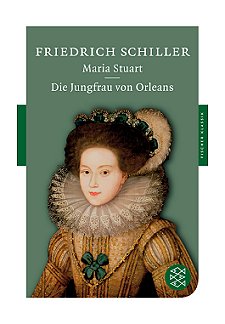
Maria Stuart is een majestueus koninginnendrama waarin twee legendarische vorstinnen uit de Europese geschiedenis elkaar naar het leven staan: Elizabeth I van Engeland (Chris Nietvelt) en de katholieke Maria Stuart van Schotland (Halina Reijn).
Schiller schreef een bloedstollende reconstructie van de laatste dagen van Maria Stuart, veroordeeld wegens het beramen van een aanslag op Elizabeths leven en wachtend op haar executie. Haar gevangenschap is de culminatie van een jarenlange rivaliteit tussen de twee vorstinnen waarbij Maria zich voortdurend opwerpt als Engelse troonopvolger en zodoende zorgt voor een klimaat van achterdocht en dreiging. Schiller laat op subtiele wijze zien hoe Elizabeth net op het ogenblik dat ze haar aartsrivale definitief in haar macht heeft, terugdeinst voor de verantwoordelijkheid haar ter dood te brengen. Maria Stuart lijkt minder bang te sterven dan Elizabeth om haar te doden.
Achter de maskers van de politieke macht, gaan bij Schiller vrouwen schuil van vlees en bloed; vrouwen gefascineerd door elkaar maar ook gevangen in een web van onderlinge rivaliteit en jaloezie. De puriteinse, pragmatische Elizabeth herkent in de verfijnde, flamboyante Maria die de mannen in haar leven bespeelt en voor haar kar spant, eenzelfde eenzaamheid. Zo wordt Maria Stuart niet alleen een rijk geborsteld historisch drama over macht, ambitie en verantwoordelijkheid maar ook een intiem portret van twee vrouwen gevangen in het keurslijf van hun politieke rol.
Met zijn prachtige verzen en verfijnde psychologische karaktertekening vormt Maria Stuart een hoogtepunt in het oeuvre van Friedrich Schiller (1759-1805) en het Duitse classicisme.
acteurs: Chris Nietvelt, Eelco Smits, Halina Reijn, Hans Kesting, Jip van den Dool, Robert de Hoog, Katelijne Damen, Maarten Heijmans, Marc Van Eeghem, Matteo Simoni
auteur: Friedrich Schiller
vertaling: Barber van de Pol
dramaturgie: Jan Peter Gerrits
scenografie, lichtontwerp: Jan Versweyveld
muziek: Daniel Freitag
choreograaf: Emio Greco, Pieter C Scholten
kostuums: Wojciech Dziedzic
assistentie regie: Olivier Diepenhorst
assistentie scenografie: Bart Van Merode
castingadviezen: Hans Kemna
producent: Toneelgroep Amsterdam, Toneelhuis
 TONEELGROEP AMSTERDAM
TONEELGROEP AMSTERDAM
MARIA STUART
regisseur ivo van hove
van friedrich schiller
duur 2:45, incl. 1 pauze
première 03 dec 2014
fleursdumal.nl magazine
More in: Archive S-T, Schiller, Friedrich von, THEATRE
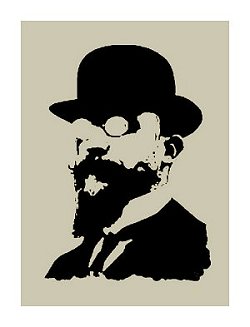
Erik Satie
(1866 – 1925)
Les Quatre-Coins
Les quatre souris.
Le chat.
Les souris agacent le chat.
Le chat s’étire.
Il s’élance.
Le chat est placé.
24 avril 1914
Erik Satie Les Quatre-Coins
fleursdumal.nl magazine
More in: Archive S-T, MUSIC, Satie, Erik
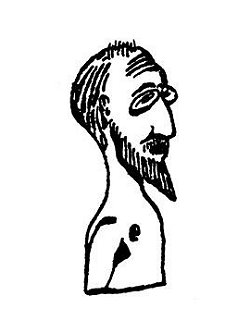
Erik Satie
(1866 – 1925)
Méditation
à Albert Roussel.
Un peu vif
Le Poète est enfermé dans sa vieille tour.
Voici le vent.
Le Poète médite, sans en avoir l’air.
Tout à coup il a la chair de poule.
Pourquoi ?
Voici le Diable !
Non, pas Lui : c’est le vent, le vent du génie qui passe.
Le Poète en a plein la tête,
du vent !
Il sourit malicieusement, tandis que son cœur pleure comme un saule.
Mais le Génie est là ! qui le regarde d’un mauvais œil : d’un œil de verre.
Et le Poète devient tout humble et tout rouge.
Il ne peut plus méditer : il a une indigestion !
une terrible indigestion de mauvais vers blancs et de
Désillusions amères !
6 octobre 1915
Erik Satie Méditation
fleursdumal.nl magazine
More in: Archive S-T, MUSIC, Satie, Erik

Edward Thomas
(1878 – 1917)
As the team’s head brass
As the team’s head brass flashed out on the turn
The lovers disappeared into the wood.
I sat among the boughs of the fallen elm
That strewed an angle of the fallow, and
Watched the plough narrowing a yellow square
Of charlock. Every time the horses turned
Instead of treading me down, the ploughman leaned
Upon the handles to say or ask a word,
About the weather, next about the war.
Scraping the share he faced towards the wood,
And screwed along the furrow till the brass flashed
Once more.
The blizzard felled the elm whose crest
I sat in, by a woodpecker’s round hole,
The ploughman said. ‘When will they take it away?’
‘When the war’s over.’ So the talk began –
One minute and an interval of ten,
A minute more and the same interval.
‘Have you been out?’ ‘No.’ ‘And don’t want to, perhaps?’
‘If I could only come back again, I should.
I could spare an arm. I shouldn’t want to lose
A leg. If I should lose my head, why, so,
I should want nothing more….Have many gone
From here?’ ‘Yes.’ ‘Many lost?’ ‘Yes, a good few.
Only two teams work on the farm this year.
One of my mates is dead. The second day
In France they killed him. It was back in March,
The very night of the blizzard, too. Now if
He had stayed here we should have moved the tree.’
‘And I should not have sat here. Everything
Would have been different. For it would have been
Another world.’ ‘Ay, and a better, though
If we could see all all might seem good.’ Then
The lovers came out of the wood again:
The horses started and for the last time
I watched the clods crumble and topple over
After the ploughshare and the stumbling team.
Edward Thomas poetry
fleursdumal.nl magazine
More in: Archive S-T, Thomas, Edward

Georg Trakl
(1887 – 1914)
Grodek
Am Abend tönen die herbstlichen Wälder
Von tödlichen Waffen, die goldnen Ebenen
Und blauen Seen, darüber die Sonne
Düster hinrollt; umfängt die Nacht
Sterbende Krieger, die wilde Klage
Ihrer zerbrochenen Münder.
Doch stille sammelt im Weidengrund
Rotes Gewölk, darin ein zürnender Gott wohnt,
Das vergossne Blut sich, mondne Kühle;
Alle Straßen münden in schwarze Verwesung.
Unter goldnem Gezweig der Nacht und Sternen
Es schwankt der Schwester Schatten durch den schweigenden Hain,
Zu grüßen die Geister der Helden, die blutenden Häupter;
Und leise tönen im Rohr die dunkeln Flöten des Herbstes.
O stolzere Trauer! ihr ehernen Altäre,
Die heiße Flamme des Geistes nährt heute ein gewaltiger Schmerz,
Die ungebornen Enkel.
Georg Trakl poetry
fleursdumal.nl magazine
More in: Archive S-T, Trakl, Georg, Trakl, Georg
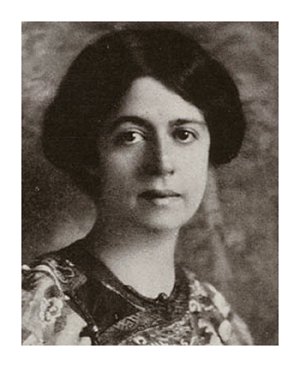
Eunice Tietjens
(1884 – 1944)
The Altar of Heaven
Beneath the leaning, rain-washed sky this great white
circle–beautiful!
In three white terraces the circle lies, piled one on
one toward Heaven. And on each terrace the
white balustrade climbs in aspiring marble, etched
in cloud.
And Heaven is very near.
For this is worship native as the air, wide as the
wind, and poignant as the rain,
Pure aspiration, the eternal dream.
Beneath the leaning sky this great white circle!
(Peking)
Eunice Tietjens poetry
fleursdumal.nl magazine
More in: Archive S-T, Tietjens, Eunice
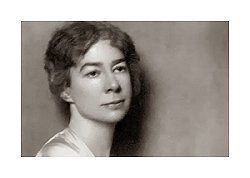
Sara Teasdale
(1884 – 1933)
“It Is Not a Word”
It is not a word spoken,
Few words are said;
Nor even a look of the eyes
Nor a bend of the head,
But only a hush of the heart
That has too much to keep,
Only memories waking
That sleep so light a sleep.
Sara Teasdale poetry
fleursdumal.nl magazine
More in: Archive S-T, Teasdale, Sara
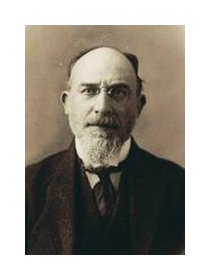
Erik Satie
(1866 – 1925)
Les Courses
La foule.
Le pesage.
Achat du programme.
Vingt et vingt.
Aux rubans.
Départ.
Ceux qui se dérobent.
Les perdants (nez pointus et oreilles tombantes.)
26 mars 1914
Erik Satie Les Courses
fleursdumal.nl magazine
More in: Archive S-T, Erik Satie, Satie, Erik
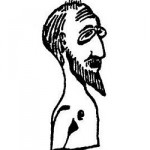
Erik Satie
(1866 – 1925)
Le Feu d’Artifice
Comme il fait noir !
Oh ! un feu de Bengale !
Une fusée !
Une fusée toute bleue !
Tous admirent.
Un vieillard devient fou.
Le bouquet !
6 avril 1914
Erik Satie Le Feu d’Artifice
fleursdumal.nl magazine
More in: Archive S-T, MUSIC, Satie, Erik
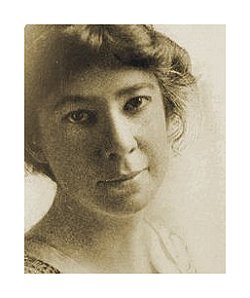
Sara Teasdale
(1884 – 1933)
Young Love
I
I cannot heed the words they say,
The lights grow far away and dim,
Amid the laughing men and maids
My eyes unbidden seek for him.
I hope that when he smiles at me
He does not guess my joy and pain,
For if he did, he is too kind
To ever look my way again.
II
I have a secret in my heart
No ears have ever heard,
And still it sings there day by day
Most like a caged bird.
And when it beats against the bars,
I do not set it free,
For I am happier to know
It only sings for me.
III
I wrote his name along the beach,
I love the letters so.
Far up it seemed and out of reach,
For still the tide was low.
But oh, the sea came creeping up,
And washed the name away,
And on the sand where it had been
A bit of sea-grass lay.
A bit of sea-grass on the sand,
Dropped from a mermaid’s hair–
Ah, had she come to kiss his name
And leave a token there?
IV
What am I that he should love me,
He who stands so far above me,
What am I?
I am like a cowslip turning
Toward the sky,
Where a planet’s golden burning
Breaks the cowslip’s heart with yearning,
What am I that he should love me,
What am I?
V
O dreams that flock about my sleep,
I pray you bring my love to me,
And let me think I hear his voice
Again ring free.
And if you care to please me well,
And live to-morrow in my mind,
Let him who was so cold before,
To-night seem kind.
VI
I plucked a daisy in the fields,
And there beneath the sun
I let its silver petals fall
One after one.
I said, “He loves me, loves me not,”
And oh, my heart beat fast,
The flower was kind, it let me say
“He loves me,” last.
I kissed the little leafless stem,
But oh, my poor heart knew
The words the flower had said to me,
They were not true.
VII
I sent my love a letter,
And if he loves me not,
He shall not find my love for him
In any line or dot.
But if he loves me truly,
He’ll find it hidden deep,
As dawn gleams red thro’ chilly clouds
To eyes awaked from sleep.
VIII
The world is cold and gray and wet,
And I am heavy-hearted, yet
When I am home and look to see
The place my letters wait for me,
If I should find ONE letter there,
I think I should not greatly care
If it were rainy or were fair,
For all the world would suddenly
Seem like a festival to me.
IX
I hid three words within my heart,
That longed to fly to him,
At dawn they woke me with a start,
They sang till day was dim.
And now at last I let them fly,
As little birds should do,
And he will know the first is “I”,
The others “Love” and “You”.
X
Across the twilight’s violet
His curtained window glimmers gold;
Oh happy light that round my love
Can fold.
Oh happy book within his hand,
Oh happy page he glorifies,
Oh happy little word beneath
His eyes.
But oh, thrice happy, happy I
Who love him more than songs can tell,
For in the heaven of his heart
I dwell.
Sara Teasdale poetry
fleursdumal.nl magazine
More in: Archive S-T, Teasdale, Sara
Thank you for reading Fleurs du Mal - magazine for art & literature